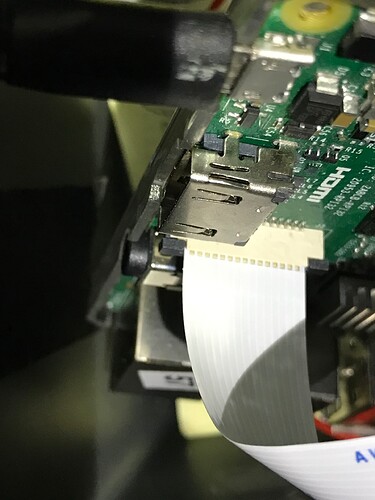Hi Dion,
As for picamera2 dependencies I executed
sudo apt install -y python3-kms++
sudo apt install -y python3-pyqt5 python3-prctl libatlas-base-dev ffmpeg python3-pip
sudo pip3 install numpy --upgrade
sudo pip3 install picamera2 --upgrade
Reboot
libcamera-still -o photo.jpg
Preview window unavailable
[0:01:04.205817214] [1561] INFO Camera camera_manager.cpp:293 libcamera v0.0.0+3897-c3c878a9
ERROR: *** no cameras available ***
Then I ran a python script with the module picamera2 and the OV5647 camera and got
[0:04:55.549017523] [2345] INFO Camera camera_manager.cpp:293 libcamera v0.0.0+3897-c3c878a9
Camera(s) not found (Do not forget to disable legacy camera with raspi-config).
Camera init sequence did not complete.
Traceback (most recent call last):
File “/usr/local/lib/python3.9/dist-packages/picamera2/picamera2.py”, line 237, in init
self._open_camera()
File “/usr/local/lib/python3.9/dist-packages/picamera2/picamera2.py”, line 447, in _open_camera
if not self._initialize_camera():
File “/usr/local/lib/python3.9/dist-packages/picamera2/picamera2.py”, line 412, in _initialize_camera
raise RuntimeError(“Camera(s) not found (Do not forget to disable legacy camera with raspi-config).”)
RuntimeError: Camera(s) not found (Do not forget to disable legacy camera with raspi-config).
During handling of the above exception, another exception occurred:
Traceback (most recent call last):
File “/home/pi/aplicaciones/scriot.py”, line 14, in
camera2 = Picamera2()
File “/usr/local/lib/python3.9/dist-packages/picamera2/picamera2.py”, line 244, in init
raise RuntimeError(“Camera init sequence did not complete.”)
RuntimeError: Camera init sequence did not complete.
Legacy camera is already disabled.
Camera connection is okay (replacing Bullseye sd card by a Buster one camera is okay)
Thank you
PS: I get the same errors with 16MP camera attached
# For more options and information see
# http://rpf.io/configtxt
# Some settings may impact device functionality. See link above for details
# uncomment if you get no picture on HDMI for a default "safe" mode
#hdmi_safe=1
# uncomment the following to adjust overscan. Use positive numbers if console
# goes off screen, and negative if there is too much border
#overscan_left=16
#overscan_right=16
#overscan_top=16
#overscan_bottom=16
# uncomment to force a console size. By default it will be display's size minus
# overscan.
#framebuffer_width=1280
#framebuffer_height=720
# uncomment if hdmi display is not detected and composite is being output
#hdmi_force_hotplug=1
# uncomment to force a specific HDMI mode (this will force VGA)
#hdmi_group=1
#hdmi_mode=1
# uncomment to force a HDMI mode rather than DVI. This can make audio work in
# DMT (computer monitor) modes
#hdmi_drive=2
# uncomment to increase signal to HDMI, if you have interference, blanking, or
# no display
#config_hdmi_boost=4
# uncomment for composite PAL
#sdtv_mode=2
#uncomment to overclock the arm. 700 MHz is the default.
#arm_freq=800
# Uncomment some or all of these to enable the optional hardware interfaces
dtparam=i2c_arm=on
#dtparam=i2s=on
#dtparam=spi=on
# Uncomment this to enable infrared communication.
#dtoverlay=gpio-ir,gpio_pin=17
#dtoverlay=gpio-ir-tx,gpio_pin=18
# Additional overlays and parameters are documented /boot/overlays/README
# Enable audio (loads snd_bcm2835)
dtparam=audio=on
# Automatically load overlays for detected cameras
#camera_auto_detect=1
camera_auto_detect=0
# Automatically load overlays for detected DSI displays
display_auto_detect=1
# Enable DRM VC4 V3D driver
dtoverlay=vc4-kms-v3d
max_framebuffers=2
# Run in 64-bit mode
arm_64bit=1
# Disable compensation for displays with overscan
disable_overscan=1
[cm4]
# Enable host mode on the 2711 built-in XHCI USB controller.
# This line should be removed if the legacy DWC2 controller is required
# (e.g. for USB device mode) or if USB support is not required.
otg_mode=1
[all]
[pi4]
# Run as fast as firmware / board allows
arm_boost=1
#https://datasheets.raspberrypi.com/camera/picamera2-manual.pdf
#Dice que en /boot/config.txt es mejor borrar gpu_mem
#Lo comento
#ando probando porque se me enlentece todo y no se por que
[all]
#gpu_mem=128
#dtoverlay=imx519
